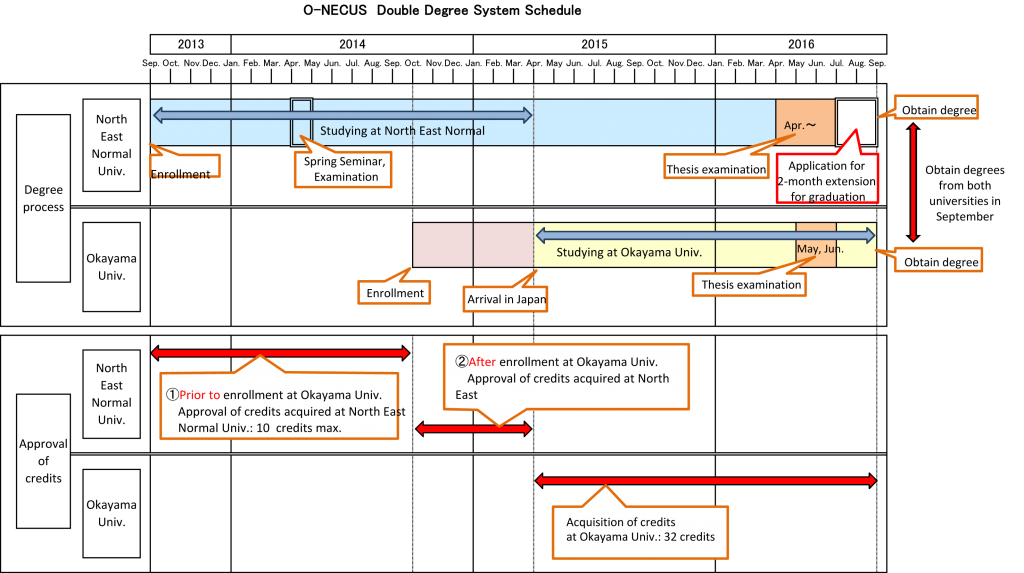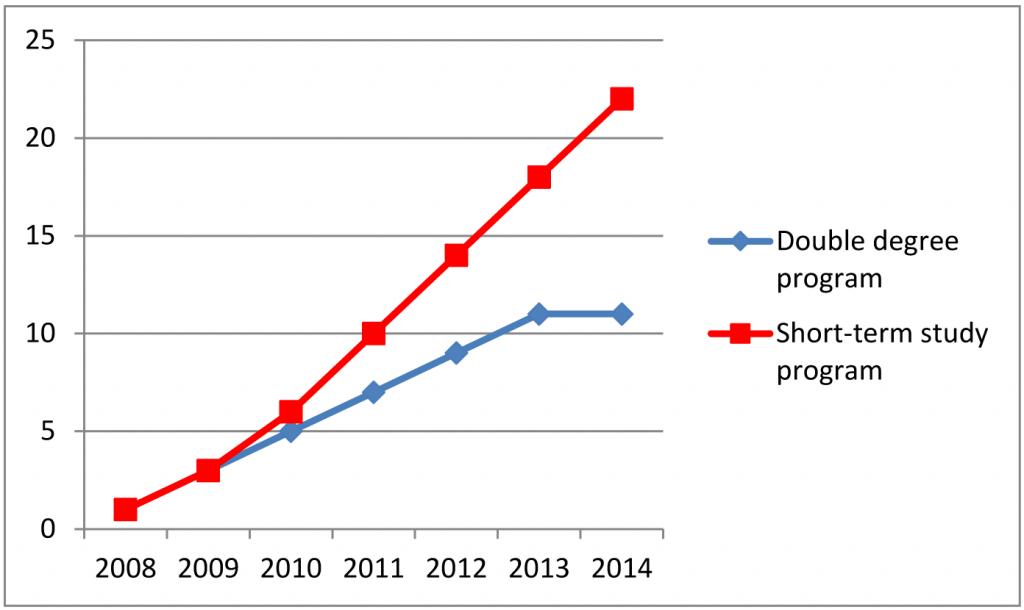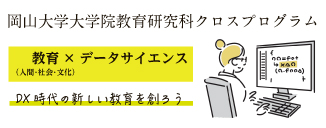O-NECUS
Okayama University-North East China Universities Platform,
Graduate Student Exchange Program (O-NECUS)
Double degree and short-term student exchange programs
O-NECUS is an abbreviation of the “Okayama University-North East China Universities platform, Graduate Student Exchange Program.” Okayama University, working jointly with six universities in northeast China, have built this educational consortium out of a clear need to build international standards and ensure quality of graduate degree programs, and to foster the great human potential in both countries. As part of the O-NECUS program, Okayama University’s Graduate School of Education has been accepting master’s degree students from China’s North East Normal University since 2008.Following is an overview of the O-NECUS program.
1 Double degree system
The goal of the School Teacher Training Program is to send forth teachers with a broad outlook and dynamism to schools that function as important educational settings (kindergartens, elementary schools, junior high schools, and special needs schools). The goal of the School Nurse Training Program is to educate school nurses to support children’s development by promoting their health and fitness in educational settings.
1) System characteristics
It is possible to obtain a master’s degree from both Okayama University and North East Normal University, enrolled as a regular graduate student, satisfying requirements of both universities. A master’s degree can be obtained in Japan and China at the same time.
2) Qualifications
- The program is limited to first-year students enrolled in an O-NECUS-participating university master’s course 3-year program, or to prospective students planning to enroll in an O-NECUS- participating university master’s course 2-year program.
- Students must participate in the Autumn Seminar held every year by the Okayama University Graduate School of Education.
- Students must attain a score of at least 110 points on the Japanese Language Aptitude Test N2, or 61 points on the TOEFL-iBT.
- Department acceptance must be confirmed.
3) Admission process
- Participate in Autumn Seminar.
- Fill in the necessary information on the “O-NECUS program admission pre-survey”. (December-January of first year)
- Contact prospective academic advisors and discuss study plan. (December-January of first year)
- Submit application form etc. (in Japanese to Okayama University). (February-March of first year)
- Take interview and written examination. (First April after university admission)
- Receive decision on admission. (First June after university admission)
- Apply for visa. (Immediately after announcement of acceptance)
- Follow admission procedures. (First August of first year)
- Enrollment at Okayama University. (First October of second year)
- Arrival in Japan. (First April of second year)

4) Recruitment capacity
Total of 3 people.
5) Examination fees, admission fees, tuition, etc.
Examination fees, admission fees and tuition will be waived.
6) Accommodations
To date all O-NECUS foreign students have been able to stay at Okayama University-owned accommodations, of which there are 4 types.
-Kuwanoki housing: 16,000 yen / month (including Internet fees)
-Fukui housing: 28,000 yen / month (including Internet fees)
-International House: 27,000 yen / month (including TV reception fees, Internet fees)
-International Student Shared House: 23,000 yen / month (including Internet fees)
7) Travel and living expenses
These must be borne by the student. (Approximate standard of living expenses: 1,200,000 yen / year.) However, scholarship programs are available, such as the following:
“Reservation Program for Monbukagakusho(MEXT) Honors Scholarship for Privately Financed International Students Spring Enrollment (University Recommendation)”
“Okayama University International Exchange Fund”
Aside from this, students must submit a certificate of deposit balance of more than 1,200,000 yen to the Immigration Bureau of Japan at the time they begin the program in Japan.
2 Short-term study abroad (credit transfer) system
1) System characteristics
Students enrolled for six months to one year, as non-regular students (special auditing students), can receive credits and research guidance from academic advisors in a short-term student exchange program.
2) Qualifications
- The program is limited to O-NECUS-participating university master’s students.
- Students must participate in the Autumn Seminar held every year by the Okayama University Graduate School of Education.
- Students must attain a score of at least 110 points on the Japanese Language Aptitude Test N2, or 61 points on the TOEFL-iBT.
- Department acceptance must be confirmed.
3) Admission process
- Participate in Autumn Seminar.
- Fill in the necessary information on the “O-NECUS program admission pre-survey”. (December-January of first year)
- Contact prospective academic advisors and discuss study plan. (December-January of first year)
- Submit application form etc. (in Japanese to Okayama University). (February-March of first year)
- Take interview and written examination. (First April after university admission)
- Receive decision on admission. (First June after university admission)
- Apply for visa. (Immediately after announcement of acceptance)
- Follow admission procedures. (First August of first year)
- Arrival in Japan and enrollment at Okayama University. (First October of second year)
4) Enrollment capacity
Total of 5 people.
5) Handling fees, admission fees, tuition, etc.
Examination fees, admission fees and tuition will be waived.
6) Accommodations
To date all O-NECUS foreign students have been able to stay at Okayama University-owned accommodations, of which there are 4 types.
-Kuwanoki housing: 12,000~15,000 yen / month (including Internet fees)
-Fukui housing: 18,000 yen / month (including Internet fees)
-International House: 20,000 yen / month (including TV reception fees, Internet fees)
-International Student Shared House: 23,000 yen / month (including Internet fees)
7) Travel and living expenses
These must be borne by the student. (Approximate standard of living expenses: 1,200,000 yen / year.) However, scholarship programs are available, such as the following:
“Student Exchange Support Program (Scholarship for Short-term Study in Japan)”
“Okayama University International Exchange Fund”
Aside from this, students must submit a certificate of deposit balance of more than 1,200,000 yen to the Immigration Bureau of Japan at the time they begin the program in Japan.
3 Acceptance history
The number of students participating in O-NECUS programs (cumulatively) from 2008 to 2014 is as follows. As you can see, the number of students accepted in the double-degree program totals 11, and the number in the short-term study abroad program totals 22 (33 altogether).

Research themes include, for example: “A Comparison of Contents in Japanese and Chinese Textbooks”; “Tragic Love Growing out of the Gap between Cultures—Focus on ‘Maihime’”; “A Comparative Study of Civic Education in Japanese and Chinese Junior High Schools”; “A Contrastive Study on Grammar Teaching in High Schools of China and Japan”; “The Impact of Working Memory Capacity on Students’ Learning of Japanese”; “A Comparative Study of Chinese and Japanese Elementary and Middle School Music Textbooks”; “A Sino-Japanese Comparative Study on Elderly Living Alone”.
Following are two messages from students studying in the O-NECUS double degree program.
We sincerely hope that as many people as possible will come and learn through the O-NECUS program at the Okayama University Graduate School of Education.
“A system that gives me many choices for my future”
Zhao Mengjiao
I am Zhao Mengjiao, a first-year graduate student at Okayama University. I signed up for the double degree program one year ago. I studied Japanese for four years at university. The academic attitude in Japan is said to be very deliberate and precise, and I wanted to feel that atmosphere and the national character of Japanese society, so I came here to study abroad and to learn Japanese at the source. I chose the double degree program because I wanted to experience the life of study at Okayama University for as long as I could, not just as a short-term exchange student. In this program I can experience more than an ordinary Chinese or Japanese graduate student. I think the greatest attraction of the double degree program is that, in three years, I can take a master’s degree in both China and Japan. This system gives me many choices for my future. It is also possible for me to proceed to a doctoral degree in either Japan or China, which I think could be quite useful for my future employment.
“A step into the future I envision for myself”
Liu Qing
I am enrolled in China’s North East Normal University, studying in the O-NECUS double degree program as an exchange student in the Graduate School of Education at Okayama University. Currently I am studying the “meaning and function of the term ‘Tsutsuaru’” as my master’s thesis theme. As a Japanese language major at North East Normal University, I decided to study abroad in Japan to enrich myself in earnest through the literature collections and studies available here. In addition, I have been very interested in the life and culture of Japan since studying Japanese in my college days. Upon coming to Japan and experiencing its culture and customs, I immediately felt a greater desire to research the Japanese language. Through doing research at Okayama University Graduate School, I feel that my knowledge and understanding of Japanese have deepened. Also, the many opportunities to experience presentation practice and seminars in formats different from China’s have expanded my ideas and vision. However, at the same time, I feel that I have not truly studied enough until now. Therefore, Okayama University Graduate School has given me opportunities to grow and to enhance my research career. Studying at Okayama University Graduate School is a step into the future I envision for myself.















